
In an era where the specter of digital threats looms large, the pressing question on your mind might be – does LifeLock identity theft protection truly deliver? With the rise of sophisticated cybercrime, the defense of your personal data is more urgent than ever.
Our exhaustive, straight-to-the-point LifeLock review will meticulously dissect every facet of their service. We’ll scrutinize LifeLock’s pricing tiers, delve into the user experience, and assess its fortitude against the myriad online perils that confront us daily. From the cunning phishing scams that lure you into surrendering confidential information to the insidious malware that covertly compromises your devices, and the treacherous allure of unsecured Wi-Fi networks – our review measures how LifeLock holds the line against these omnipresent hazards.
Our in-depth analysis and testing of LifeLock have been thorough and methodical. We’ve delved into its services to provide you with an honest and comprehensive review. Armed with these critical insights, you’re now equipped to make a smart decision on safeguarding your digital existence.
Key takeaways from testing LifeLock
- LifeLock offers comprehensive protection with features like three-bureau credit monitoring, dark web and social media monitoring, and up to $1 million in insurance coverage for losses due to identity theft.
It provides a range of identity protection services including monitoring of personal information, advanced threat detection, financial transaction alerts, and a user-friendly experience with 24/7 customer support.
Despite its robust security features, LifeLock cannot prevent all forms of identity theft and does not cover every transaction, making personal cybersecurity practices also essential.
- Additionally, it’s wise to keep an eye on the cost adjustment post-first year, as well as the privacy implications related to the Five Eyes alliance and the company’s history with breaches.
LifeLock pros and cons
Now, let’s examine the advantages and disadvantages of selecting LifeLock for safeguarding your online privacy.
+ Pros
30-day free trial period (recently added)
A VPN with family plans
Comprehensive identity theft protection service
- Can be combined with Norton 360 antivirus software
Up to $1 million insurance for certain costs incurred from identity theft
User-friendly interface and easy setup
Stolen wallet protection
Simple-to-use mobile apps
– Cons
- 3-bureau monitoring is available in higher-tier plans only
- Confusing paid plan structure
- Higher cost compared to some competitors
LifeLock features overview
Before we delve into specifics, let’s take a quick overview of what LifeLock offers:
Monitoring personal information – Tracks your Social Security number (SSN), credit card details, and other sensitive data to detect unauthorized use.
- Dark web surveillance – Scans dark web databases for any trace of your data, alerting you to potential exposure.
- Financial transaction monitoring – Keeps an eye on your financial transactions and alerts you to any suspicious activities, allowing for swift action to minimize damage.
- Credit monitoring – Monitors your credit activity, alerting you to changes that could indicate fraud.
- Lost wallet protection – Assists in quickly canceling and replacing important cards and documents if your wallet is lost or stolen.
- Insurance and stolen funds reimbursement – LifeLock offers up to $1 million in insurance to cover losses due to identity theft across all plans, and in its premier tier, it provides the same amount for reimbursement of stolen funds, ensuring solid financial protection.
- 24/7 customer support – Round-the-clock customer service is available to assist with any issues or concerns.
- 30-day free trial – Recently introduced a 30-day free trial period, allowing new users to experience the service before committing.
Two-factor authentication – Offers two-factor authentication (2FA) to secure your account, adding an extra layer of security against unauthorized access.
See all LifeLock features here >
LifeLock’s features suggest a focus on user safety, offering a comprehensive and proactive approach to identity theft protection.
What LifeLock is and how does it work?
Founded in 2005 and in collaboration with Norton 360, LifeLock delivers a suite of identity theft protection services. It keeps a vigilant eye on your credit reports and scours the dark web for any signs of your personal data. If something seems amiss, LifeLock is quick to send you an alert. Though no service can guarantee absolute protection or track every transaction, LifeLock offers a safety net with its recovery assistance.
LifeLock works with Norton 360 to add antivirus protection to its services, and it throws in Norton Secure VPN with family-focused plans. This expands the scope of protection beyond just monitoring credit and personal information. LifeLock has several plans that offer varying levels of coverage, some including legal assistance and compensation for losses after identity theft.
Company background: Can we trust LifeLock?
Norton LifeLock, previously known as LifeLock Inc., was established in 2005 and became notable for its identity theft prevention software. After being acquired by Symantec in 2017, it underwent rebranding to Norton LifeLock in 2019 and to Gen Digital Inc. in 2022. The company’s history includes the integration of LifeLock with Norton 360 services and a controversial past with legal challenges, such as the FTC’s $12 million fine in 2010 for deceptive advertising claims.
Despite past issues, including the resignation of co-founder Robert J. Maynard, Jr. in 2007 amid personal controversies, Norton LifeLock has improved its services and security measures. It actively counters fraudulent use of its name and steers clear of shady practices, demonstrating its dedication to consumer trust.
Also, LifeLock has garnered an impressive 4.5 score on Trustpilot, which speaks volumes about its credibility. However, it’s worth noting that a small portion of reviewers, approximately 9%, have rated LifeLock with 1 star, indicating some areas of concern. Among the main concerns from users are the complicated and time-consuming process of managing ID theft alerts on LifeLock’s website, occasional technical issues, and customer service experiences that sometimes include receiving false alarms.
Consequences of the 2022 data breach
LifeLock experienced a security incident in December 2022 when a credential stuffing attack led to unauthorized access to over 6,000 user accounts. In this type of attack, cybercriminals use stolen account credentials to attempt to gain entry into other accounts, leveraging the fact that people often reuse passwords. The flurry of unauthorized login attempts was detected on December 16th.
The company responded by informing affected users in January 2023 and has since taken steps to bolster its security measures. While personal information was exposed, LifeLock has reassured its customers of its continued commitment to protecting their data. This occurrence is a stark reminder that in the digital world, staying safe isn’t a one-time setup but a continuous game of cat and mouse with cyber threats.
Core features: What do you get with LifeLock?
LifeLock’s suite of features is crafted to provide robust protection against identity theft. Let’s explore some of these key features in detail.
Security monitoring and alerts
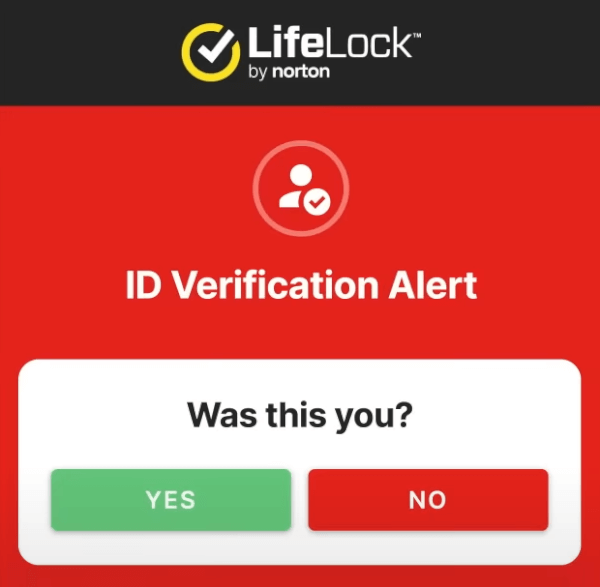
LifeLock’s vigilant security monitoring and alert system, which includes watchful tracking of potential identity misuse, is engineered to detect signs of identity theft early. By keeping an eye on your personal data, such as your SSN, credit card information, and even your investment accounts, LifeLock stands guard, ready to notify you of any unusual activity.
Dark web monitoring
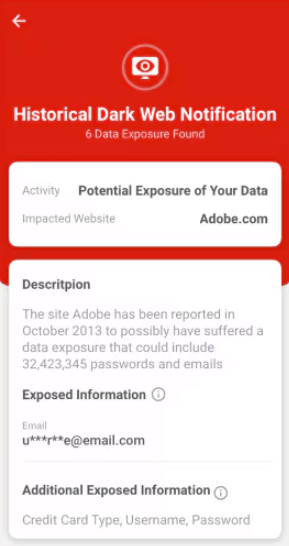
Pro Tip: If you use any websites reported in a data breach, change your passwords ASAP.
One standout feature of LifeLock is its dedicated surveillance of the dark web – an infamous region of the internet often linked with unlawful activities. LifeLock diligently searches this hidden underbelly for any signs of your personal details. Should it discover your information being misused, you’ll receive an alert promptly, empowering you to take swift action to protect your accounts.
This proactive measure adds an extra layer of defense, ensuring that your sensitive information is safeguarded – even in the more obscure and potentially dangerous areas of the web.
Comprehensive three-bureau credit monitoring with credit reports
LifeLock subscribers get monthly credit reports and daily credit-score updates from all three major credit bureaus. Plus, with the top-tier plan, you can lock your TransUnion credit file. This helps keep your credit safe from unauthorized access.
You can easily lock or unlock your file whenever you want, controlling who can check your credit when you apply for new credit or loans.
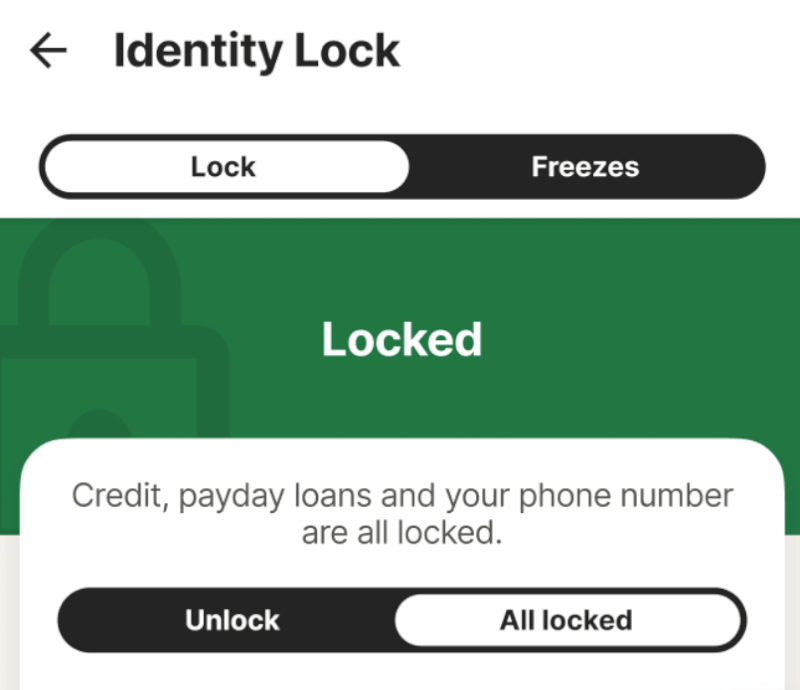
But if you go for the lower-tier plans, you’ll get more basic credit monitoring. They might only watch one credit bureau and might not include free credit reports. If you choose these plans, know their limits. To fully protect your credit, you’ll have to freeze or lock your credit files with Experian and Equifax separately since LifeLock only does this for TransUnion. Still, LifeLock makes protecting your TransUnion credit file simple, adding a security layer that’s both effective and easy to use.
Note: Credit lock and credit freeze serve similar purposes, yet they differ in operation. A credit freeze stops the opening of new accounts, while a credit lock, offered by credit bureaus, allows for quicker locking and unlocking of your credit.
Financial monitoring and stolen funds reimbursement
LifeLock’s financial monitoring feature keeps you informed about important transactions in your financial accounts, like credit, checking, and savings. It also watches for any suspicious changes to your accounts or new ones being opened – red flags for potential identity theft. Even your 401(K) investments get a watchful eye.
With the “Ultimate Plus” plan, you’re covered for up to $1 million in losses related to identity theft. This includes compensating for personal expenses and covering legal costs.
While the “Ultimate Plus” plan offers robust coverage, lower-tier plans start with a $25,000 limit for stolen funds and personal expenses, which increases to $100,000 for mid-tier plans. If you’re after consistent coverage across all plan levels, you might want to check out alternatives like Aura. They offer $1 million for stolen funds and legal expenses in all their plans, just like LifeLock’s $1 million legal fee coverage.
Stolen wallet protection
If you lose your wallet or it gets stolen, LifeLock’s Stolen Wallet protection jumps in to assist by:
- Cancelling and replacing vital credentials like credit cards and your driver’s license
Lessening the impact of the loss
Speeding up your recovery process
If you input your driver’s license, debit, and credit card numbers into LifeLock’s secure dashboard, their customer service team can help with the steps needed to cancel and replace your cards. This protection is a standard feature in all LifeLock pricing tiers, ensuring all subscribers have this crucial support without any plan restrictions.
Social media monitoring
LifeLock’s social media monitoring is a crucial defense in today’s digital world. It’s not just about protecting your accounts on platforms like Facebook, LinkedIn, and Twitter – it’s about safeguarding your online presence across all channels, from YouTube to TikTok.
The service scans for signs of cyberbullying, hate speech, and unauthorized changes to your account settings – key indicators of potential hacking or misuse. Getting alerts for suspicious activities, like unexpected profile changes or the sharing of risky links, can be a lifesaver in preventing a breach.
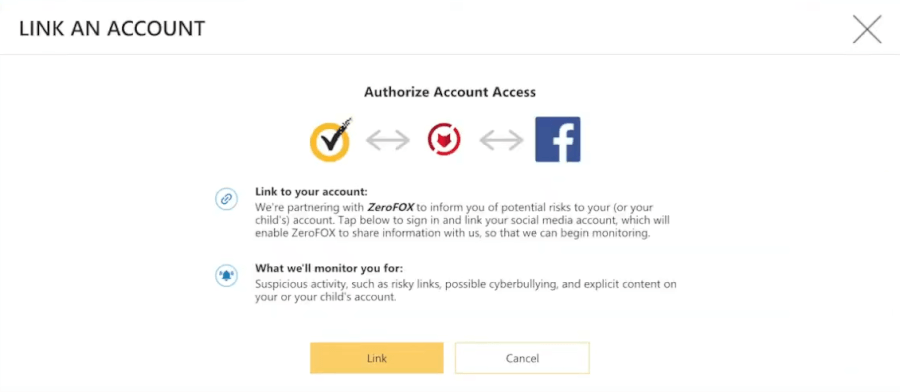
For families, LifeLock goes the extra mile by keeping an eye on children’s accounts, watching out for cyberbullying and exposure to harmful content. To set up this protection, you’ll need to grant LifeLock access to your social media accounts. But with that information, LifeLock can effectively monitor your accounts for any takeover attempts.
And for those on the top-tier plan, the monitoring doesn’t stop there – it extends to platforms like TikTok, ensuring a comprehensive safety net for all your online interactions.
Learn more about LifeLock’s plans here >
LifeLock’s security extras
On top of its core features, LifeLock provides a variety of security extras that boost its protection capabilities even more.
It’s part of Norton security suite
Although LifeLock doesn’t come with Norton antivirus software or VPN, you can pair it with Norton 360 for a stronger online defense. Combining LifeLock with Norton 360 offers proactive protection against various online threats, like malware aiming to steal your digital identity.
Norton’s anti-malware tools serve as a vigilant digital shield, providing real-time protection against viruses, worms, trojans, and ransomware. It’s a reliable defender, proactively keeping your devices secure from cyber threats.
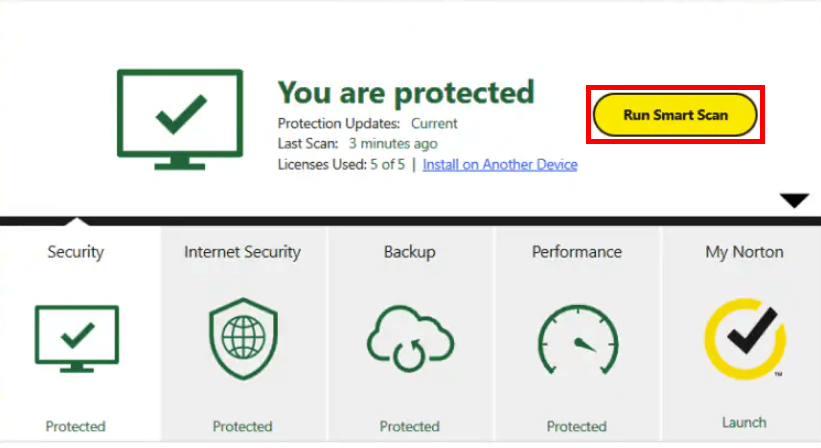
Moreover, integrating Norton Secure VPN with your security setup encrypts your online connections, providing a more private browsing experience and an extra layer of privacy.
2FA login
LifeLock’s 2FA feature fortifies your account’s defenses, insisting on a second proof of identity beyond just the password. This could be a code received through a text, an email, or generated by an authentication app. In some cases, it could even involve biometric verification like a fingerprint or facial recognition.
By requiring this additional verification step, LifeLock ensures that even if your password falls into the wrong hands, your account remains protected.
Sex offender registry reports
In LifeLock’s Ultimate Plus plan, subscribers get a special feature – notifications if their name and personal info show up in a sex offender registry. This feature is meant to alert you to any potential misuse of your personal information in a sensitive situation.
File-sharing network searches
LifeLock’s file-sharing network search feature is built to shield people from the dangers of peer-to-peer (P2P) file sharing. It actively scans these networks for any signs of your personal information. If it finds anything, LifeLock notifies you right away so you can act fast to secure your accounts and safeguard your identity.
Ease of use: Is LifeLock user-friendly?
In our testing, we found that setting up LifeLock is a breeze, thanks to its straightforward process and user-friendly interface. Whether you’re a tech guru or just getting started, the intuitive design makes it easy to navigate.
What’s impressive is LifeLock Select’s seamless integration with Norton device security, ensuring compatibility across various platforms like Windows, Mac OS, Android, and iOS. This wide compatibility means users can install LifeLock on their devices and enjoy its features, as long as they have an active internet connection for setup and security updates.
Getting started with LifeLock
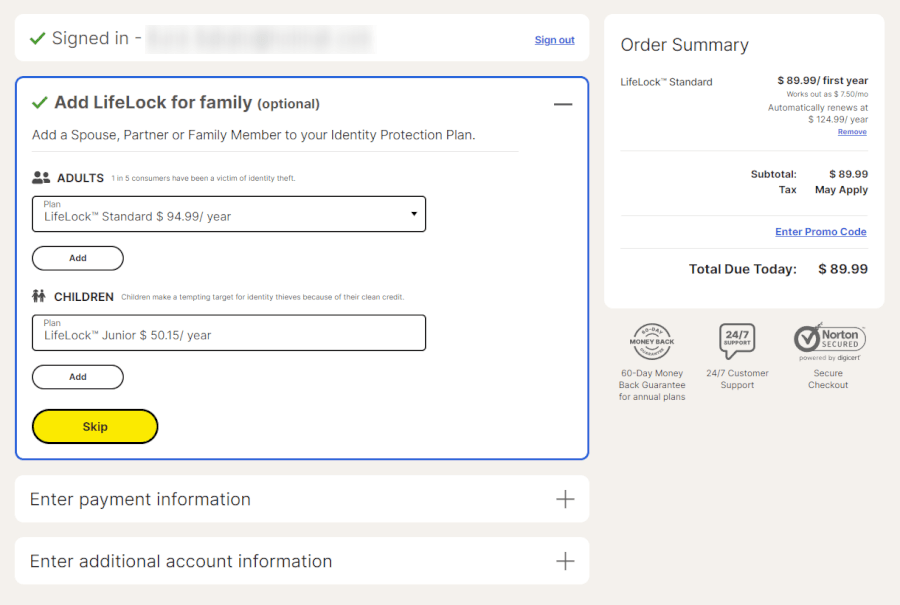
Getting started with LifeLock is straightforward. You’ll need to enter essential personal information, including your name, SSN, birthdate, address, phone number, and email address. The next step is to provide your credit card details and agree to the subscription terms.
You then add accounts for LifeLock to monitor, which could range from social media to bank accounts. The time this takes will vary based on how many accounts you want to protect.
After setting a secure password and entering your billing details, you complete the purchase and gain access to the LifeLock dashboard. This is where you’ll manage settings and view alerts, keeping you informed about the security of your personal information.
Navigating LifeLock’s interface
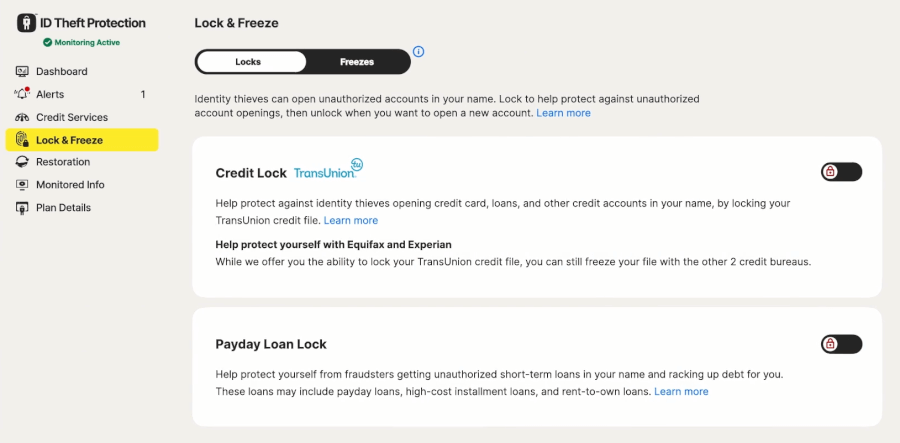
We were pretty impressed with LifeLock’s interface – it’s elegantly designed, with an intuitive dashboard that presents crucial information in a format that’s easy to digest. With a glance, you can check your credit score, monitor alerts, and see your identity lock status. Plus, clickable icons throughout the dashboard provide extra insights to help you understand the services better.
The top tabs on the dashboard give quick access to vital sections like alerts for notifications of suspicious activities, credit for credit scores and bureau reports, identity lock for controlling your credit file security, transactions for monitoring financial activities, ID restoration for resources on identity recovery, and monitored info for the data LifeLock is safeguarding for you.
All in all, LifeLock’s user-friendly interface ensures smooth navigation and management of your identity protection tools, making it accessible for users of all levels.
LifeLock’s mobile apps
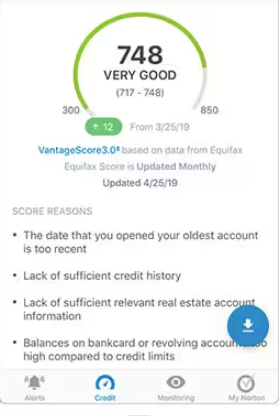
We found LifeLock’s mobile apps for Android and iOS to be a real asset, making the transition from desktop to mobile a breeze. They let you manage your account smoothly and get instant alerts wherever you are. The interface is easy to use and you won’t have any trouble.
However, we noticed something that might confuse users – there are two apps to choose from, LifeLock for Norton360 and LifeLock ID Theft Protection, which could lead to uncertainty about which app to download and use. But once you’re logged in, both apps are user-friendly and easy to navigate, so you’ll get the hang of it quickly.
Customer support: What sort of help do you get with LifeLock?
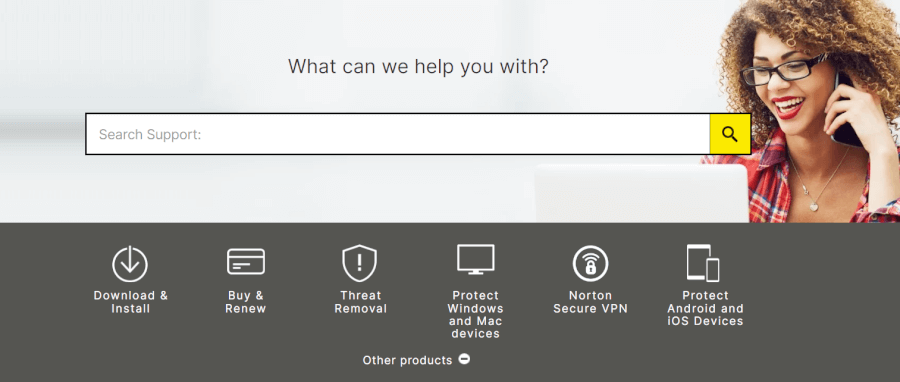
LifeLock stands out in the identity protection market with its 24/7 customer support via phone and live chat. We found the support team to be generally responsive and knowledgeable, especially for general inquiries and straightforward issues.
One problem, however, is that we noticed the support staff’s expertise seems to lean more towards Norton’s antivirus products than LifeLock’s identity services. This can sometimes lead to inconsistent experiences, particularly for more complex issues.
Overall, LifeLock’s customer support is highly regarded for its availability and accessibility. It’s worth noting that all plans include 24/7 support, and the company ensures a toll-free number is readily available for quick assistance. Priority support is reserved for subscribers of the top-tier plan. While we didn’t find a direct chat, email, or a dedicated support portal, the company offers a helpful blog with articles and FAQs for self-service options.
Plans and pricing: Is LifeLock worth your money?
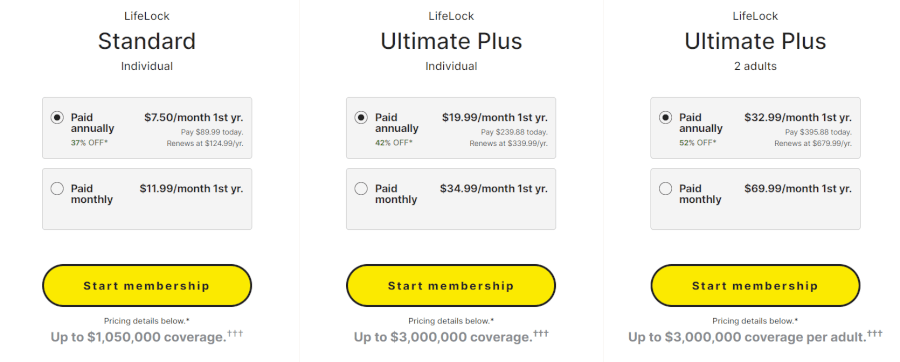
LifeLock’s pricing plans are designed to cater to a variety of needs and budgets, offering different levels of protection for individuals and families. Here is a breakdown of their plans:
Individual Packages (covers one adult only):
- Standard: $8.39/month for the first year when billed annually (then $12.49/month). This plan includes up to $25,000 in stolen funds reimbursement, the same amount for personal expense compensation, and up to $1 million coverage for lawyers and experts, supported by US-based identity restoration specialists.
- Advantage: $15.99/month for the first year (then $20.83/month). It raises the stakes with up to $100,000 in stolen funds reimbursement and personal expense compensation, alongside the $1 million coverage for legal professionals and experts, plus dedicated US-based identity restoration assistance.
- Ultimate Plus: $24.99/month for the first year (then $29.15/month). This premium plan maximizes protection with up to $1 million in stolen funds reimbursement, $1 million for personal expenses, and the same high coverage for legal costs, all backed by expert identity restoration specialists in the US.
Unfortunately, it’s clear that after the initial discounted year, LifeLock’s prices see a notable increase. This hike might give pause to some users when it comes time to renew their subscriptions.
Family Plans (two adults):
- Standard (for family): At $12.49/month with annual billing (increasing to $20.83 per month after the first year), this plan includes credit monitoring, suspicious activity alerts, and up to $25,000 in stolen funds reimbursement.
- Advantage (for family): Priced at $23.99/month when billed annually (and $39.99 per month after the first year), the Advantage plan offers up to $100,000 in stolen funds reimbursement and a wider range of monitoring services.
- Ultimate Plus (for family): At $32.99/month with annual billing (then $56.66 per month), provides the highest level of protection with up to $1 million in stolen funds reimbursement, $1 million for personal expenses, and legal coverage, along with US-based identity restoration support and three-bureau credit monitoring.
Family Plans (two adults and up to five children):
- Standard (for family with kids): Starts at $18.49/month with annual billing ($29.99/month after the first year), offering credit monitoring, alerts, and up to $25,000 in stolen funds reimbursement.
- Advantage (for family with kids): At $29.99/month on annual billing ($48.33/month after the first year), this plan adds up to $100,000 in stolen funds reimbursement and expanded monitoring services.
- Ultimate Plus (for family with kids): The top-tier plan is $39.99/month with annual billing, increasing to $66.66/month thereafter, with up to $1 million in stolen funds reimbursement, comprehensive credit monitoring, and identity restoration support.
Note: Only the Ultimate Plus package covers all three bureaus, while lower-tier plans focus on just one.
(opens in a new tab)”>See all LifeLock prices and deals here >
It’s also worth noting that LifeLock does not offer a free trial but provides a 60-day money-back guarantee on annual plans.
How to get started with LifeLock: A quick guide
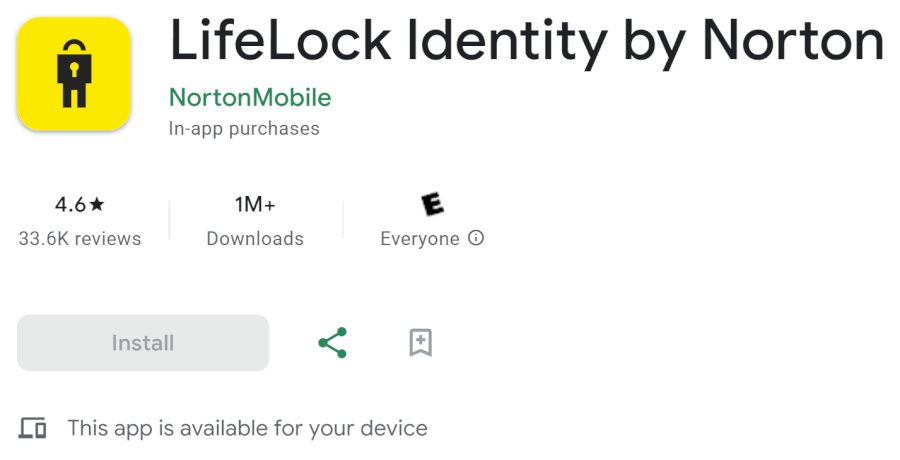
Getting started with LifeLock is simple – just follow this step-by-step guide:
Initiate your LifeLock journey – Begin by visiting the LifeLock website to create your account.
Provide your details – Enter essential personal details such as your full name, date of birth, and SSN to set the foundation for your identity protection.
Choose your protection plan – Evaluate LifeLock’s array of plans and select the one that aligns with your security needs and budget constraints.
Access your dashboard – Once registered, gain access to your LifeLock dashboard, your command center for monitoring and managing your identity protection services.
Download the mobile app – Take LifeLock’s protection wherever you go with the mobile app for Android and iOS. It reflects the desktop dashboard’s ease of use in a mobile-friendly format, giving you streamlined access to account management and real-time alerts.
By following these steps, you’ll be equipped with LifeLock’s comprehensive identity theft protection and ready to secure your personal information.
Considering alternatives: How does LifeLock compare to competitors?
While LifeLock provides solid identity theft protection, it’s worth exploring other options too. Both LifeLock and Aura offer credit monitoring and dark web surveillance, but Aura stands out with its $1 million coverage for stolen funds and legal expenses across all plans – a perk not available in LifeLock’s lower tiers. Plus, Aura’s single family plan might be a more cost-effective choice for households with multiple users.
See our Aura vs LifeLock guide for more info.
IdentityForce caught our attention with its emphasis on personal security. It offers advanced fraud monitoring and PC protection tools like anti-phishing and anti-keylogging. While LifeLock teams up with Norton 360, IdentityForce is tailored for those who want comprehensive identity security.
IDShield’s plans come with consultation from private investigators, a unique feature that provides personalized support in identity theft cases. They also monitor social media and manage online reputations, which is vital in today’s digital world. While LifeLock offers a broader range of features and higher insurance coverage, IDShield’s investigative services offer a hands-on approach to protection.
See the Aura vs IDShield comparison here.
Other identity theft protection reviews on RestorePrivacy:
- Aura Review
- Experian IdentityWorks Review
- IDShield Review
- McAfee Review
- IdentityIQ Review
- Identity Guard Review
LifeLock FAQ
What services does LifeLock provide?
LifeLock is more than just an identity theft protection service—it’s your personal digital sentinel. It diligently monitors a range of personal data points, from your Social Security number to your credit details, and sends you timely alerts if it detects anything that smells fishy. But LifeLock isn’t just about monitoring; it’s got your back with recovery services ready to spring into action if your identity does take a hit.
What level of protection does LifeLock offer against identity theft?
While LifeLock delivers an impressive array of tools to detect and alert you to various identity theft threats, it’s worth noting that no service can offer complete protection against every possible scenario. LifeLock shines with its monitoring capabilities and prompt alerts, but complementing its features with your own diligent cybersecurity habits is also crucial.
Has LifeLock faced any controversy?
Yes, LifeLock has faced its share of controversies. The most significant was in 2010 when the FTC imposed a hefty $12 million fine on the company for making deceptive advertising claims about the extent of its protection services.
This event was a wake-up call for LifeLock, prompting a comprehensive overhaul of its practices. Since that time, LifeLock has bolstered its security protocols and services, showing a clear dedication to consumer protection and trust.
Conclusion: Is LifeLock a good choice for you?
LifeLock offers comprehensive identity theft protection with a suite of features designed to guard personal information. Its round-the-clock customer support and user-friendly interface enhance the service’s reliability. Key benefits include effective identity theft safeguards, vigilant credit monitoring, and in-depth dark web surveillance. However, the price increase after the first year and the limitation of three-bureau monitoring to the higher-tier plans are potential drawbacks.
In conclusion, despite its higher cost and complex plan structure, LifeLock’s robust protection makes it a strong contender for safeguarding your digital identity.
This LifeLock identity theft protection review was last updated on July 21, 2024.

Leave a Reply